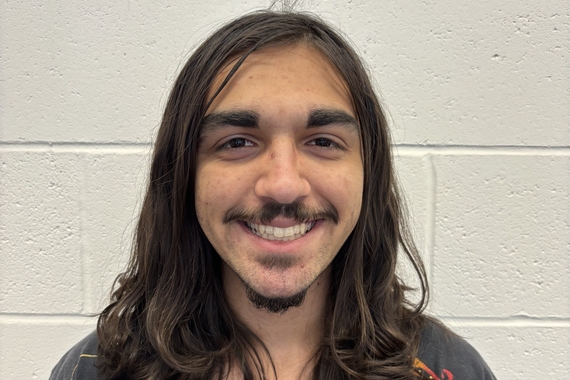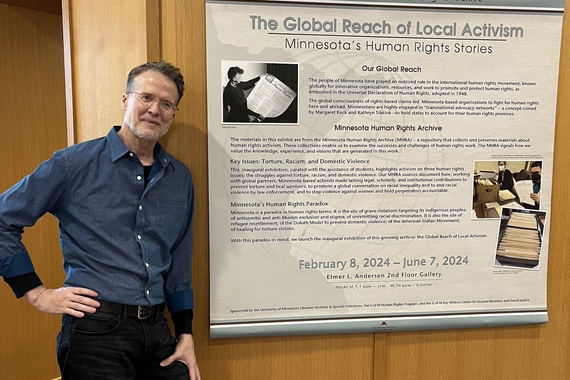Jack DeWaard and Linus Chan Receive HRI Grant for Project Looking at U.S. Immigration
In the wake of the 2016 election the James H. Binger Center for New Americans launched the Human Rights Defenders Project (HRDP) which asks volunteer observers to attend immigration court hearings and record their observations and concerns in order to hold government agencies accountable for actual or potential human rights violations.
The HRDP has collected extensive and important data on the workings of immigration court from volunteer observers. Not only did the observers collect raw data on the individual cases, such as bond amounts, and whether people were represented, but observers collected information on whether the system and court processes were "fair" and "just."
Dr. Jack DeWaard (Sociology) and Linus Chan (Law), along with Sociology PhD student Chris Levesque, are working to analyze this data to answer questions on what factors are important in deciding whether a court process appears to be fair- which in turn helps decide when the process is legitimate. The Human Rights Program (HRP) sat down with Dr. DeWaard and his graduate student, Christopher Levesque, to discuss their work and how the project has grown since receiving the Human Rights Initiative (HRI) grant.
Dr. DeWaard began his career in academia focusing on migration from an European context, and has experience researching forced migration due to climate change and environmental catastrophes, among other perspectives on migration. This project is Dr. DeWaard’s transition towards researching U.S. immigration law and the rights of asylum seekers. Linus Chan, alternatively, has been focusing on human rights law and U.S. immigration since the beginning of his career. In addition to the expertise of these faculty and their students the HRDP benefits from partnerships with The Advocates for Human Rights and Robins Kaplan LLP, both of which bring important resources, knowledge and skills to the project.
The goal of the project is to answer the question, “Is the court legitimate?” Short answer, according to the Bar Association: it is not. The Bar Association released a statement concluding that, “The immigration court system is irredeemably dysfunctional.” There are over one million cases on the waitlist for a hearing, which amounts to a two year wait time for many immigrants. During this time immigrants who have been detained are kept in jail.
Volunteers are the backbone of the HRDP, which currently has 168 volunteer observers, who on average have each participated in 19 shifts of court observation. Each observation is a shift from 9 am - 12 pm or 1 pm - 4 pm Monday - Thursday, in that time observers witness and document 15 - 20 court cases. Each individual case receives only 5 - 10 minutes with the immigration judge. The challenges created by large caseloads and short trial times are compounded by the fact that many of the individuals on trial do not speak english and may not have access to translators.
The results show that the volunteers generally recorded similar observations prior to the training. The results that the volunteers compile highlight public perceptions of what’s fair and what’s not. One specific facet of immigration court that highlights its inequitable system is that immigrants are given the right to an attorney, but they are required to pay for it. This is contradictory to U.S. criminal court, where people have a right to a public defender. More likely than not, the people in immigration court have an unsuccessful case.
Dr. DeWaard and Mr. Chan’s project aims to more fully understand what is happening in immigration court. Prior to the initiation of their project, HRDP observers were given some training, but it was not sufficient to provide quality data. To understand how the proceedings are perceived, Dr. DeWaard and Mr. Chan decided to develop measures for understanding how consistent the data is, and to update the training and data coding processes to ensure that ongoing data collection would be of the highest quality. To do this Dr. DeWaard and Mr. Chan conducted extensive interviews with current observers to establish a baseline for the existing data. Creating a set of data that is usable for analysis.
They found that the volunteer observers are not only vital for the data collection but that they also were able to provide important feedback for improving the data collection system and research project. In addition to the quantitative data requested by the researchers, the observers often note important qualitative data not requested by the data collection tool. For example, when the person on trial is asked “Would you like to be deported?” and the person says “Yes,” and a woman watching the trial stands up and leaves. This type of observation is important for understanding the relational trauma and pain that coincides with deportation.
This newly usable data set has allowed Dr. DeWaard, Mr. Chan and their student research assistant to begin exploring themes and relationships. For example, they have found that there is a relationship between whether the immigrant has committed a crime and if they are granted bond. Bond is money paid to secure the release of the detained individual. The results also show that the volunteers generally recorded similar observations prior to the training. The results that the volunteers compile highlight public perceptions of what’s fair and what’s not. One specific facet of immigration court that highlights its inequitable system is that immigrants are given the right to an attorney, but they are required to pay for it. This is contradictory to U.S. criminal court, where people have a right to a public defender. More likely than not, the people in immigration court have an unsuccessful case. February 2019 esults can be viewed here, and August 2019 results can be viewed here.
Dr. DeWaard and Mr. Chan’s project has garnered significant interest from colleagues both inside and outside of academia. It has become apparent that there is significant interest around the country in observing immigration court and developing systems and best practices for doing so in the process. Dr. DeWaard and Mr. Chan decided to assemble a team of collaborators based in the Twin Cities, Chicago, Los Angeles, and Washington D.C. to submit a grant proposal to the National Science Foundation’s Law and Society (NSF-LSS) Program for approximately $1.5 million for a three-year project. Building on our work in this project, the overarching aim of the proposed NSF-LSS project is to ensure human rights in immigration court by getting third-party observers into immigration courts across the country, collecting and analyzing comparable data on both objective and subjective measures of procedural justice and fairness, and developing systems and best practices for observing immigration court in a public way that interrogates the very legitimacy of U.S. immigration court and promotes volunteerism and engagement in the process.



